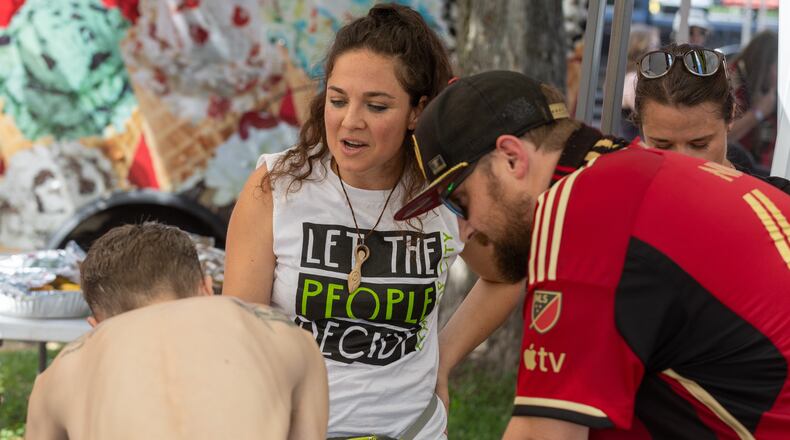If prior petition drives are any guide, an effort to force a referendum on Atlanta’s public safety training center could be hindered by the city’s stringent, line-by-line review of 104,000-plus signees.
A large number of rejected signatures would keep the question off the ballot.
Petitions rarely succeed in Georgia, and opponents of the “Cop City” project announced this week they’re holding off on finalizing their petition for the city’s verification until they collect more signatures.
The signatures gathered so far might not be enough, even though only 58,000 confirmed signatures are needed. The Georgia Constitution allows citizen-led referendums if 15% of the city’s registered voters sign on.
Signatures on petitions can be rejected based on judgment calls on whether handwriting on the petition matches manuscript from when Atlantans registered to vote. Signatures also wouldn’t count if officials can’t identify a registered voter based on their name, address and birth year.
“Success or failure of a petition campaign tends to come down to the extent to which election officials do their job carefully or not,” said Bryan Sells, a voting rights attorney who has been involved in about a half-dozen petition efforts, none of which were successful. “That’s because it’s virtually unreviewable: If the election officials do a lousy job and don’t take their job seriously, it’s very difficult to get a court to intervene.”
Groups that want a vote on the police and firefighter facility should gather five times more signatures than they’re supposed to need, and even then there would be no guarantee the petition would be approved by the city, Sells said.
The Vote to Stop Cop City Coalition had planned to turn in signatures to the city on Monday, but it decided to wait because of concerns about the city’s announcement that it would check every signature, one by one.
“That the city of Atlanta would use such a subjective and unreliable process is shameful and undermines the integrity of the city’s validation procedure,” the New Georgia Project and two dozen other voting organizations said in an open letter Tuesday.
Signature verification practices for absentee ballots have drawn criticism from both Democrats and Republicans in recent years.
During the 2018 election for governor, a federal judge ordered the secretary of state’s office to inform local election offices that they shouldn’t reject absentee ballots because of alleged signature mismatches.
Before the 2020 election, a settlement in a Democratic Party lawsuit opposing inconsistent signature matching required election officials to check with their co-workers before rejecting ballots, and it required quick notification to voters when their ballots were rejected, as mandated by a state election rule.
Then, after Democrats used absentee ballots more than Republicans during the presidential election, the GOP-controlled General Assembly passed a voting law that requires additional forms of ID besides signatures.
“The people checking the signatures are doing the best they can, but they’re not handwriting specialists, so it is somewhat subjective,” said Trey Hood, a University of Georgia political science professor who is conducting a signature verification study. “My signature looks horrible, and that’s very anecdotal, but a lot of electronic signatures aren’t great.”
One recent petition drive in Georgia was successful, when coastal residents recorded enough signatures to get a vote on a proposed commercial space launchpad in Camden County. By a nearly 3-1 margin, they voted to stop the county from buying land for the project.
But signature-gathering efforts often fall short. For example, no third-party candidate for the U.S. House has ever collected enough signatures to appear on the ballot in Georgia under a 1943 state law that requires a petition be signed by at least 5% of registered voters.
“It’s just so obvious that the powers that be are going to make this as difficult as possible,” said Elizabeth Melton Gallimore, executive director for the Libertarian Party of Georgia. “It seems like you should be able to vet signatures without some of those unnecessary restrictions.”
Supporters of the petition say the city of Atlanta could have randomly checked a sample of signatures instead of verifying each one, or it could simply accept the petition and put the question on the ballot.
City officials say they need to confirm that the petition only includes Atlanta voters with a stake in the referendum, and they need to guard against fake names and forgeries.
The city clerk’s office announced this week that it will be transparent in the signature verification process by scanning each page of signatures, providing digital copies to the public, ensuring that each name corresponds with a registered voter and checking that their signatures match.
“What we are not going to do is be fast in anything that we are doing. We are going to try to be deliberate and accurate as to not unintentionally disenfranchise any registered voter,” said Forest Webb III, a former city clerk who has been brought in to help supervise the verification process.
Missing or incomplete information could lead to even more rejections than mismatched signatures, said Alex Street, a political science professor at Carroll College in Helena, Montana, who has researched signature verification.
“Scholarship on handwriting does show that it tends to become more variable due to factors such as aging, illness or disability, and also that it is more variable among people who did not grow up with English as their native language,” Street said.
Opponents of the facility have until Sept. 23 to deliver the petition to the city with enough signatures to qualify for a referendum. Then the municipal clerk will have 50 days to confirm the list has enough qualifying signatures of registered voters and present the petition to the City Council.
That timeline leaves almost no chance that the issue will appear on this November’s ballot, even if enough signatures are confirmed. The next opportunity for a public vote would likely occur during next spring’s primary election.
— Staff writer Riley Bunch contributed to this article.
About the Author
Keep Reading
The Latest
Featured





